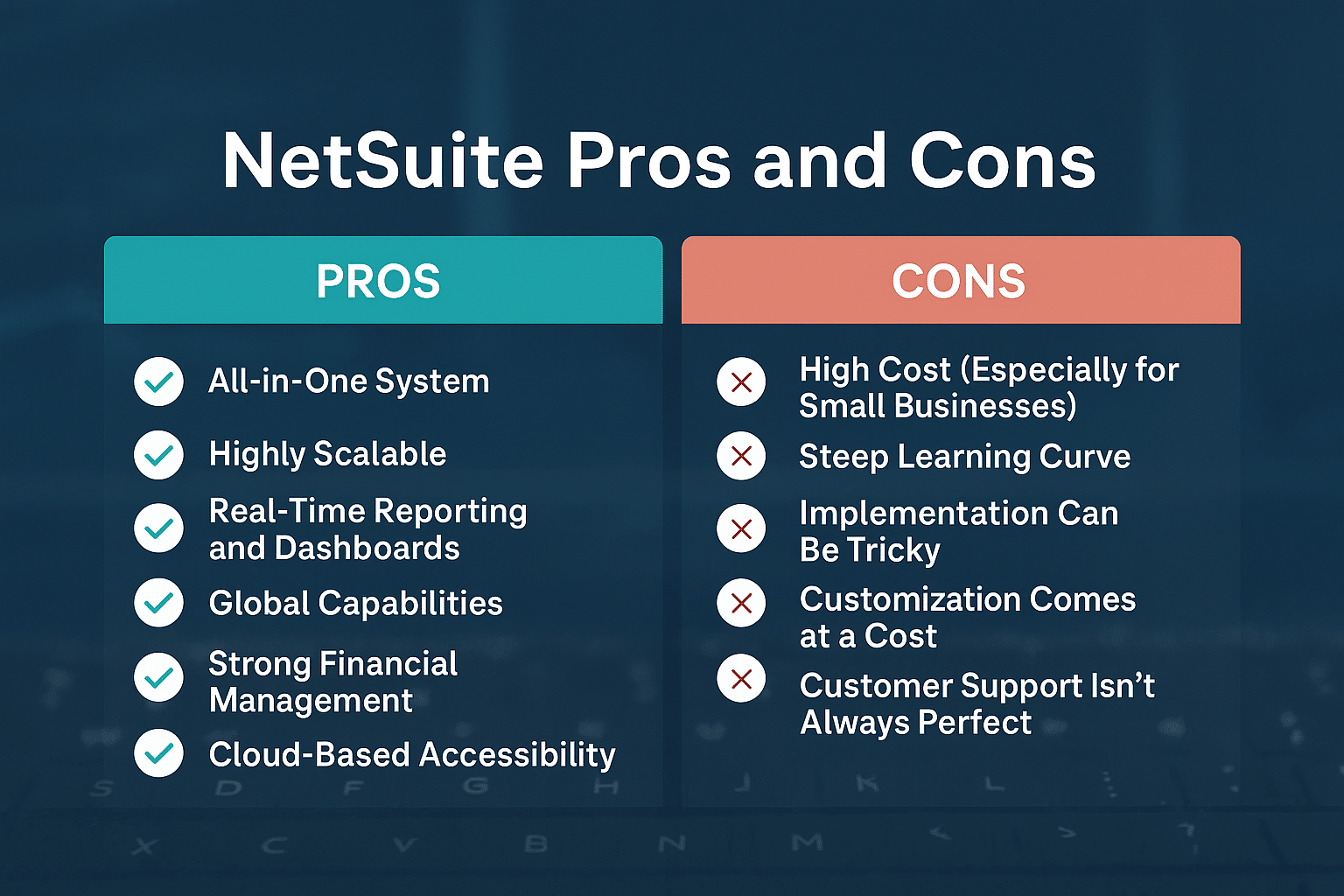ERP system selection produces overwhelming choices among available options. Discussion about enterprise resource planning systems typically includes the mention of NetSuite. Nobody can afford to overlook the NetSuite pros and cons during the critical decision of making such a big financial commitment. This blog will deliver complete information about NetSuite to help you make wise choices for your business operations.
Understanding NetSuite:
NetSuite is a cloud-based ERP system that offers a wide range of functionalities, from financial management to inventory control and customer relationship management (CRM). Founded in 1998, it was one of the first cloud-based solutions and has grown to serve over 30,000 organizations worldwide.
So, why should you care? ERP systems designed for business operations help companies optimize their workflows and increase output while generating business growth opportunities for organizations. Bridgefoxjournal emphasizes that as with any other tool, you need to comprehend the implications before usage. Let’s NetSuite pros and cons:
The Pros of NetSuite
- Cloud-Based Accessibility
The main benefit you receive from NetSuite comes from its ability to operate in a fully cloud-based ERP system. Your data is readily available through any internet connection, enabling you to handle your business from anywhere. You get business control at any location through this cloud-based system. Real-time data accessibility through the cloud platform suits businesses that conduct operations in various offices and teams working remotely. - Comprehensive Feature Set
The application suite provided through NetSuite unifies different business operations. Your business needs find complete resolution through NetSuite which houses every critical application from accounting to finance and e-commerce and supply chain management. All business operations become more efficient through this single roofing solution because organizations no longer require various software systems that prove both expensive and inconvenient to manage. - Scalability Advantages
The requirements for your ERP system expand in proportion to your business growth. Luckily, NetSuite is highly scalable. System upgrades are straightforward with NetSuite since you can expand functionalities or grow user numbers through simple procedures that avoid major interruptions. Organizations seeking business expansion should consider NetSuite as an attractive software solution. - Integration Capabilities
NetSuite leads the market through its exceptional capability to link with multiple tools and systems. NetSuite serves as a connector which allows your business to exchange data between your Salesforce CRM and Shopify e-commerce systems through its integration capabilities. The integration system allows businesses to develop unified operations. - Real-Time Visibility
Your business operations gain full-time visibility when you implement NetSuite. Site users can access real-time views of both financial performance and sales data and inventory numbers. The system’s transparent reporting capabilities make your organization better equipped for decision-making and market shifts respons. - Customization Options
Every company has its own distinctive qualities which NetSuite understands fully. Users can customize all components of NetSuite, including workflows and dashboards, together with reports to meet individual business requirements. The system includes adaptable functions that prevent users from being obligated to accept predefined standardized solutions.
The Cons of NetSuite
- Cost Considerations
The cost is practically always a determining element. NetSuite poses expensive costs for organizations including small business entities. Paying for Subscriptions under this model requires spending fees each month and year and results in accumulating financial costs. Budget management becomes crucial due to possible supplementary costs dedicated to customization and integration work with NetSuite. - Implementation Challenges
The implementation of NetSuite presents substantial challenges to any organization. The implementation process needs extensive both time and financial resources. The system features friendly user interfaces yet the first setup becomes complicated mainly when organizations shift from another ERP platform. The implementation process presents difficulties for multiple organizations so organizations need to expect and adapt to learning curves. - Learning Curve
Users can easily learn NetSuite yet the system requires some level of adjustment. Staff members require proper training to extract maximum value from the platform features. Your team\’s technical proficiency will determine the need for additional training expenses due to dependent costs and training session times. - Performance Issues
User performance issues are reported mainly during the processing of large datasets. Every delay in system response decreases staff productivity when real-time information is essential to their work. Businesses need to evaluate their requirements specifically before choosing this platform since full commitment might not be appropriate without proper testing. - UI Limitations
The system functions adequately yet its visual design lacks attractive presentation. Certain users note that the system appears dated when compared to current ERP solutions in the market. New interface designs that lead users by intuition will have a strong influence on how users accept the system. - Support Concerns
Finally, let’s talk about support. Users have reported both positive and negative experiences regarding the customer support services offered by NetSuite. Support packages should be considered for additional investment according to your requirements to get proper help during system failures.

Is NetSuite Right for Your Business?
Taking the right decision for an ERP system stands as a major organizational commitment.
We have created this quick summary, which comes from our previous discussion:
NetSuite becomes a perfect solution under these circumstances:
The expansion of your business requires an ERP that will expand alongside your growth.
The system handles international business needs which require multi-currency and multi-subsidiary management.
A sufficient budget exists to put the platform into effective operation while providing training and necessary assistance.
NetSuite cannot be appropriate under these circumstances:
Fundamental functionality should guide your usage of NetSuite since you operate as a small business evolving toward product success.
Your company maintenance needs basic enough operations that affordable, simpler systems will suffice.
Your organization lacks the necessary internal personnel to operate a complicated platform.
NetSuite stands as a transformative investment that results in extended business growth potential when you have ready funds to support its implementation and deployment.
Such quick and affordable solutions could appear problematic for your needs.
Conclusion: Weighing NetSuite Pros and Cons
Any organization should recognize the NetSuite Pros and Cons to decide on the right system.
The Upside:
- Centralized control of your operations
- Real-time reporting
- Scalable and globally capable
The Downside:
- Expensive for small businesses
- Learning curve
- Potential for unexpected costs
NetSuite delivers outstanding benefits to suitable organizations, yet it does not work as a universal solution for every business. Devote the required effort to determine how this solution matches your organization\’s expansion needs and financial allocation framework, and system complexity level. Whenever you encounter difficulties understanding things, just contact us without any delay. Talking with an experienced individual regarding this matter can eliminate your troubles, which may last for several months.


Leave a Reply